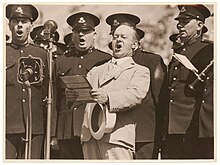This article includes a list of general references, but it lacks sufficient corresponding inline citations. (February 2014) |
Peter Dawson | |
|---|---|
 | |
| Background information | |
| Birth name | Peter Smith Dawson |
| Also known as | J. P. McCall, Will Strong, Will Danby, Hector Grant, Arthur Walpole, Robert Woodville, Evelyn Byrd, Peter Allison, Denton Toms, Charles Weber, Arnold Flint, Gilbert Mundy, Geoffrey Baxter, Alison Miller |
| Born | 31 January 1882 Adelaide, South Australia, Australia |
| Died | 27 September 1961 (aged 79) Sydney, New South Wales, Australia |
| Genres | Opera, oratorio, song |
| Occupation(s) | bass-baritone singer, songwriter |
| Years active | 1899–1950s |

Peter Smith Dawson (31 January 1882 – 27 September 1961) was an Australian bass-baritone and songwriter[1] in the 1920s and 1930s, when he was possibly the most popular singer of that era. He said that at the time the gramophone was "an instrument of torture", excruciating for the recording artist, who needed "lungs of leather" to make an impression on the wax cylinders, which captured nothing but the very loudest noises.
However, Dawson made his first recording in 1904, and continued to release songs for EMI and HMV until 1958. In this time he performed classical tunes such as Tchaikovsky's "Don Juan Serenade" and popular songs like "Waltzing Matilda".
He was the subject of a biography, Peter Dawson: The World's Most Popular Baritone written by Peter Burgis and Russell Smith. That biography estimates Dawson had in excess of 1500 recordings issued during his career.
In 1984, he was chosen by the Guinness Book of Recorded Sound as one of the top ten singers of all time, alongside Elvis Presley and Enrico Caruso.[citation needed]